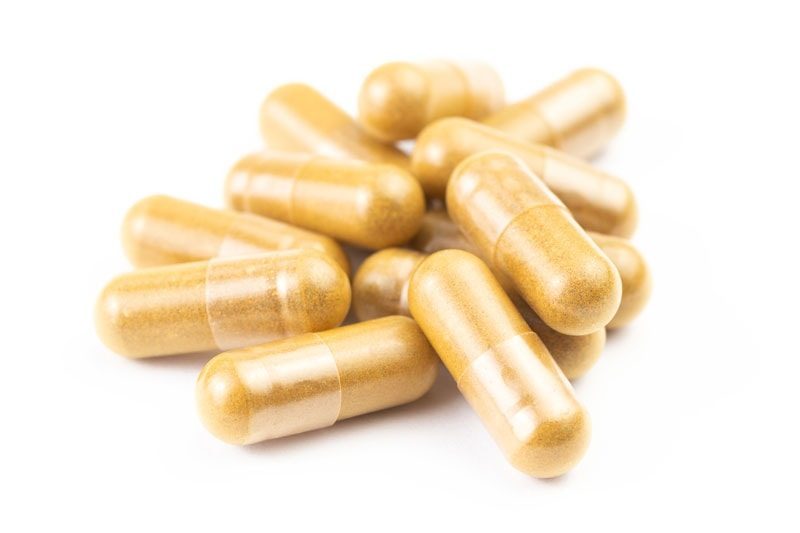If you’re developing a supplement, you should know that the supplement format you choose for your product can have a significant impact on the way it works. Some formats are longer lasting. Others are faster acting. Others have greater bioavailability, meaning that more of the supplement’s active ingredients are able to enter the bloodstream. Even different pill formats, like capsules vs tablets, work differently and have different advantages and disadvantages.
Are you interested in learning about the differences between capsules vs tablets?
Although capsules and tablets work in similar ways, there are some key differences that supplement brands should keep in mind when deciding between these two formats for their supplement manufacturing. These considerations include price, durability, dosage capabilities, absorption speed, bioavailability, and consumer preferences. If you’re interested in learning about pill formats, specifically the differences between capsules vs tablets, consider this your guide.
Contents
What are tablets?

Tablets are pills, containing vitamins, minerals, or other forms of dietary supplements, that are meant to be swallowed or chewed. After the tablet is swallowed, the contents of the tablet are released into the bloodstream through the digestive tract.
Tablets are made by compressing one or more powdered ingredients to form a hard, solid, smooth-coated pill. In addition to active ingredients, most tablets also contain certain additives to help bind all of its ingredients together. Some tablets also contain additional additives to improve other characteristics of the tablet, like its color, smell, or taste.
Tablets come in all different shapes and sizes. Some are round. Others are oblong. Many have a split down the middle for dosing purposes. Consumers can break the tablet apart and choose to take only half if necessary. This split also helps consumers who have trouble swallowing a full pill. Many supplement brands choose to add a smooth sugar coating to their supplements for taste, and so they’re easier to swallow.
What are capsules?

Capsules, like tablets, are pills, containing vitamins, minerals, or other forms of dietary supplements, that are meant to be swallowed. Once again, like tablets, after capsules are swallowed, their contents are released into the bloodstream through the digestive tract.
Unlike tablets, however, capsules are not made by compressing powder ingredients. Rather, powder ingredients are enclosed in an outer shell. The purpose of the outer shell is to hold the ingredients until the pill is swallowed. Once swallowed, the outer shell is broken down, and the ingredients are released into the digestive tract.
There are two types of capsules: hard-shell capsules and softgel capsules.
Hard-shell capsules

Hard-shell capsules are usually meant to carry powder ingredients. They consist of two halves that come together to form an enclosed casing around the powder ingredients. Hard-shell capsules are usually completely transparent so consumers can see the powder ingredients inside.
Softgels

Unlike hard-shell capsules, softgels carry liquid ingredients. Softgels consist of a gelatin-based shell surrounding a liquid fill. They’re produced in a process known as encapsulation which can best be described as a form/fill/seal process. Softgels are typically a bit easier to swallow than hard-shell capsules because of their malleable nature. They also have a longer shelf-life since the liquid ingredients inside are more tightly sealed.
Price differences
One of the first questions that supplement brand owners what to know in regards to capsules vs tablets involves the price differences between them. Which are cheapest to manufacture? Which are the most expensive?
Of tablets, hard-shell capsules, and softgels, tablets are typically the simplest and cheapest to manufacture. Hard-shell capsules come in second place, and softgels are usually the most complicated and most expensive.

Durability differences
Durability, also described as stability or shelf-life, is another important factor supplement brands and manufacturers should consider when choosing a format for their supplements. The format of your supplement plays a part in how long its active ingredients will last and how long these ingredients will be considered effective.
Tablets and softgels are typically longer-lasting than hard-shell capsules. This is because with tablets and softgels, the ingredients are completely sealed and unexposed to environmental factors. With hard-shell capsules, the ingredients inside are sealed but not completely. Oxygen and moisture can still make their way through the small space in which the two halves of the capsule come together.

Dosage differences
Dosing is another factor you should take into account when choosing an appropriate supplement format for your supplement. Not all pill supplements can include the same amount of ingredients. A single dose in one format may involve only one pill. In another format, the consumer may have to take two or three pills for the same dosage.
Tablets can contain a higher dosage than both softgels and capsules. This is because the ingredients in tablets are tightly compressed, which means more ingredients can be packed into one small pill. Since ingredients in softgels and hard-shell capsules can’t be compressed, both carry smaller doses of active ingredients.
Tablets also offer the option for consumers to modify their own dosage. Many tablets feature a line, called a score, so that consumers can easily break it in half and only take half a dose. This also makes it easier for consumers who have a hard time swallowing pills. They can swallow one half and then the other half, instead of the whole pill at once. Capsules and softgels don’t offer this option to consumers.
It is worth mentioning, however, that capsules can be opened, which means consumers have direct access to the powders inside. Many consumers who don’t like swallowing pills buy capsules, open them, and mix the powder ingredients on the inside with food or liquids. This method is particularly helpful for parents and caregivers.

Absorption speed
In all of the pill formats mentioned (tablets, hard-shell capsules, and softgels), the pill’s ingredients are broken down in the digestive tract, and its active ingredients are absorbed into the bloodstream. That being said, not all pill formats feature the same absorption speed.
Softgel capsules have the fastest absorption speed, meaning they have the fastest effect. It’s easy for the body to break down the capsule’s outer shell and access the readily-available liquid ingredients on the inside.
Capsules come in second place. It’s just as easy for the body to break down the capsules outer shell but more difficult for the body to absorb powder ingredients as opposed to liquid ingredients. Tablets having the slowest absorption rate.
Although fast absorption is certainly important for some supplements, namely supplements that help to ease pain or pre-workout supplements, not all supplements need to be fast-acting. In fact, some supplements work better when absorbed slowly, giving the body a slow but constant supply of the nutrients it needs, rather than all of them in one quick shot.

Bioavailability differences
When a pill is ingested, not all of its active ingredients are always absorbed into the bloodstream. Bioavailability is defined as the proportion of the supplement’s active ingredients that are actually absorbed into the blood. It should be no surprise that not all pill formats feature the same bioavailability.
Capsules and softgels have higher bioavailability than tablets, which means more of the pills’ active ingredients are absorbed in the bloodstream. This could make hard-shell capsules and softgels slightly more effective than tablets.

Consumer preferences
Last, but not least, is the topic of consumer preferences. What pill format do consumers prefer to buy? What pill format leads to more compliance from consumers? (More compliance means more sales for supplement brands.)
As a general rule, consumers prefer capsules and softgels to tablets, and they’re very clear about their reasons why – “They’re easier to swallow.” Consumers are also more compliant when taking capsules and softgels. Once again, the reason relates back to the experience of taking the pills. Capsules and softgels are easier to swallow, less likely to get stuck in the back of the throat, and are often tasteless. All of the aforementioned makes taking capsules and softgels a better experience than taking tablets.

bio
Capsules vs Tablets – Pros and Cons
We’ve reviewed the most important factors to consider when choosing a pill format for your supplement. Below is a quick snapshot of the most important advantages and disadvantages of hard-shell capsules, softgels, and tablets.
Tablets

Advantages of tablets
- Cheapest to manufacture
- Highest dosing option
- Most durable and long-lasting
Disadvantages of tablets
- Not preferred by consumers
- Slowest absorption rate
- Lowest bioavailability
Hard-shell capsules

Advantages of hard-shell capsules
- Great bioavailability
- Great absorption speed
- Preferred by consumers over tablets
Disadvantages of hard-shell capsules
- Least durable option (not long-lasting)
- Low dosing
Softgels

Advantages of softgels
- Highest bioavailability
- Fastest absorption speed
- Preferred by consumers over tablets
- Long-lasting compared to hard-shell capsules
Disadvantages of softgels
- Most expensive to manufacturer
- Low dosing
- Dosing cannot be modified in any way
Pill Formats Comparative Infographic
Click to view full-size image.

Conclusions: Choosing supplement formats

There is a lot to keep in mind when choosing appropriate formats for your supplements. That being said, with a little help, choosing formats can be a fun and exciting process.
One of the best ways to ensure that you’re making the right decision is by choosing a supplement manufacturer that can offer you advice. That way, you can get tips and advice from experts who not only understand supplement format options but also understand the industry, your exact product, and the needs of your customers.
Generation Nutra offers many types of supplement formats, including tablets, softgels, capsules, liquid vitamins, powders, and gummies.
Here are some additional benefits of building your supplement brand with Generation Nutra:
- Thousands of raw materials to choose from so you can create unique and personalized formulas.
- Advice in terms of formulation.
- Various packaging formats to choose from so you can customize your product.
- A team of in-house graphic designers to help you design custom labels for your brand.
- Advice and guidance to help you market and sell your product.

